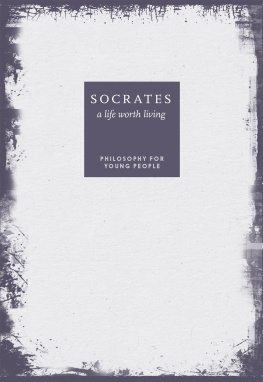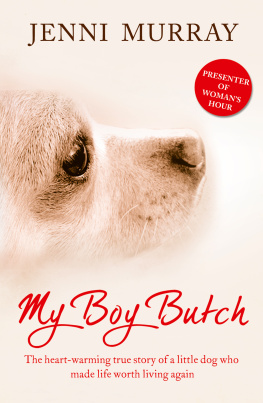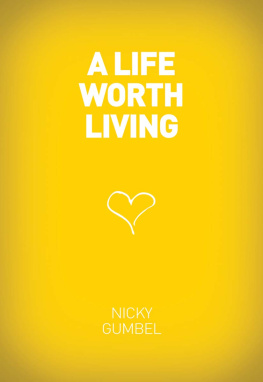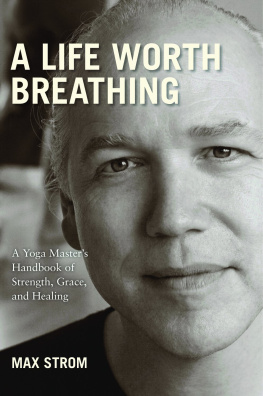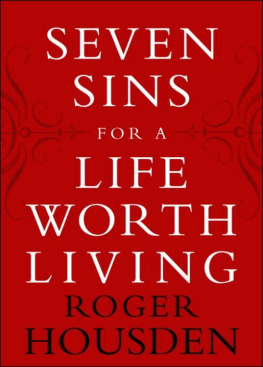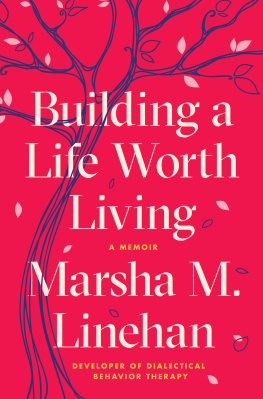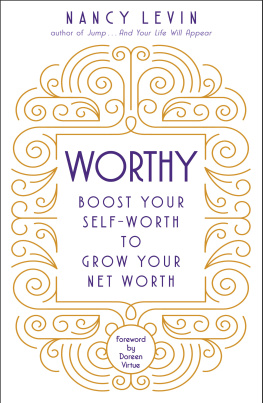A LIFE WORTH LIVING
THE 9 ESSENTIALS
BARRIE SANFORD GREIFF, M.D.
Previously published under the title Legacy

To my loving parents and special wife Carole, and my insightful children and awesome grandchildren.
We understood and believed in each other, and that made all the difference.
If you are planning for the year, grow rice.
If you are planning for the decade, grow trees.
If you are planning for the centuries, grow men and women.
Chinese Proverb
Contents
Not How did he die? but How did he live?
Not What did he gain? but What did he give?
These are the units that measure the worth
Of a man as a man regardless of birth.
Not What was his station? but Had he a heart?
And How did he play his God-given part? Was he ever ready with a word of good cheer, To bring back a smile, to banish a tear?
Not What was his shrine? nor What was his creed?
But Had he befriended those really in need?
Not What did the sketch in the newspaper say?
But How many were sorry when he passed away?
Anonymous
On a hot, steamy August day many years ago, my wife and children and I and were driving through the undulating hills of Vermont not far from Quichee Gorge.
We passed a farm sign that announced Asparagus For Sale. I stopped to buy some. Having grown up in Brooklyn, New York, I was curious about how the stuff grew.
I approached the farmer working in his field and started talking with him. He was in his mid-fifties, of medium build, and had a weather-beaten Vermont kind of look. But something about the farmer struck me immediately as odd. The two middle buttons of his long-sleeved denim shirt were undone, and I could see what appeared to be a baseball umpires chest protector sticking through the opening between the folds of fabric.
Sensing our discomfort with the heat, the farmer invited us into the house for some iced tea. We sat around his kitchen table in the center of the cool room, surrounded by all sorts of lumber and tools, which were strewn about in a haphazard way.
He asked what I did, and I said I was a physician. Without missing a beat, the farmer said matter-offactly, Oh, then youd be interested to know that Im dying.
His directness, as well as the gravity of the message, caught me off balance.
He went on to explain how hed been practicing dentistry in California for a number of years, but how during the past year, hed begun to feel tired and weak and that his bones had begun to hurt. He went to his doctor and discovered he had multiple myeloma, a disease that affects certain bones and makes them fragile and subject to fractures. He told me his prognosis was poor. His doctors didnt hold out much hope for recovery.
He went on to recount how hed become depressed. I wasnt prepared to leave life so earlyespecially when I felt there was so much to do, he said.
He sold his dental practice in California and returned to Vermont, which had been his home before he moved to the West Coast. He bought the nineteenth-century farmhouse we were sitting in and began to restore it. He stocked his pond with fish and planted an extensive vegetable garden. He seeded trees, which, he explained, would make their appearance in the years to come.
I made a conscious, deliberate decision, the dentist-turned-farmer added slowly, that as I die I would give life to everything around me. Those acts would define my existence.
I was deeply moved by what he said that afternoon in the cool of his kitchen, and he continued to occupy my thoughts throughout the ensuing year. I couldnt help but be touched by his remarkable courage and visionand by his strong need to leave a mark on the world even as he planned for his own departure.
The following summer we went back to the farm.
The repairs on the house had stopped. The hay fields hadnt seen a thresher and baler in months. The fields lay empty, practically void of vegetables. All that remained was the asparagus, which, he had explained to me the summer before, would take two seasons to grow from seed time to harvest.
A daughter or nieceI didnt feel it was my place to asktold us the farmer had died in the spring. His disease had overcome him slowly. But he had died where he had chosen to die.
Saddened, I scanned the fertile fields, the trees, the life he had planted all around him. Even as he died, his message was abundantly clear. His loss would be a gain for others. One man had provided for generations to come. It brought to my mind the old saying, The best fertilizer for a garden is the farmers shadow.
Faced with the inevitable loss of his own life, he chose to survive in the true sense of the Latin word supervivereto over-live: to live beyond his life, leaving an indelible signature on natures canvas around him from which his survivors could benefit.
Friedrich Nietzsche said that One who has a Why to live, can deal with almost any How. Id amend that to say that one who has a Why and a How to liveand passes them oncan live forever.
When we encounter touchstone events that force us to use our inward eye, we ask powerful questions. All too often, those may be the only times we ask those important questions of ourselves. They may be the few times we do a personal accounting.
The farmer, it seemed to me, had decided not to accept the standard paradigm of death being the final end to life. Instead, he chose to turn closure into openings. He left a message that said we can convert despair into hope, loss into gain, and simple acts into sacred deeds. Decay can turn into growth, and uncertainties can turn into possibilities. He reminded me of something that Jacob Bronowski had written in The Ascent of Man: Man is a singular creature. He has a set of gifts which make him unique among the animals. So unlike them, he is not a figure in the landscape. He is a shaper of the landscape the ubiquitous animal who did not find but made his home in every continent.
The farmer shaped his decision to leave something behind that transcended his own here and now. His bequest for the future in a sense shrouded him with a touch of immortalityfar more than any material goods he may have left behind. He made the heroic choice, borrowing a concept from Eastern philosophy, jai bhagwin. It means to salute the light within oneselfand illuminate everything around one for generations to come.
Ive met many people like the farmer in the course of my work, and Ive found that eight themes play themselves over and over again in the music of peoples lives. As Thomas Cahill put it, In a fundamental, ineradicable way, we still see with the eyes of our earliest ancestors, and our hearts still quicken to the same things theirs did.
At the end of the day, we need to pass on to our inheritors an understanding of these eight themes. They represent the light within ourselves that will provide illumination for generations that follow. They make up our sense of hopeour spiritual DNA for posterity. Our living legacy.
The first of these universal themes is the need to Loveto feel good about oneself and share love with special people. The second is the need to Learnto explore, stretch and grow so as to adapt to novel situations. The third is to Laborto create meaning and value in the work we do every day.
We need to recognize and experience a range of emotions in the course of living. To Laugh and experience the joy and pleasure of life. And Lament as we are humbled by the unfair and overwhelmed by the evil. We need to



